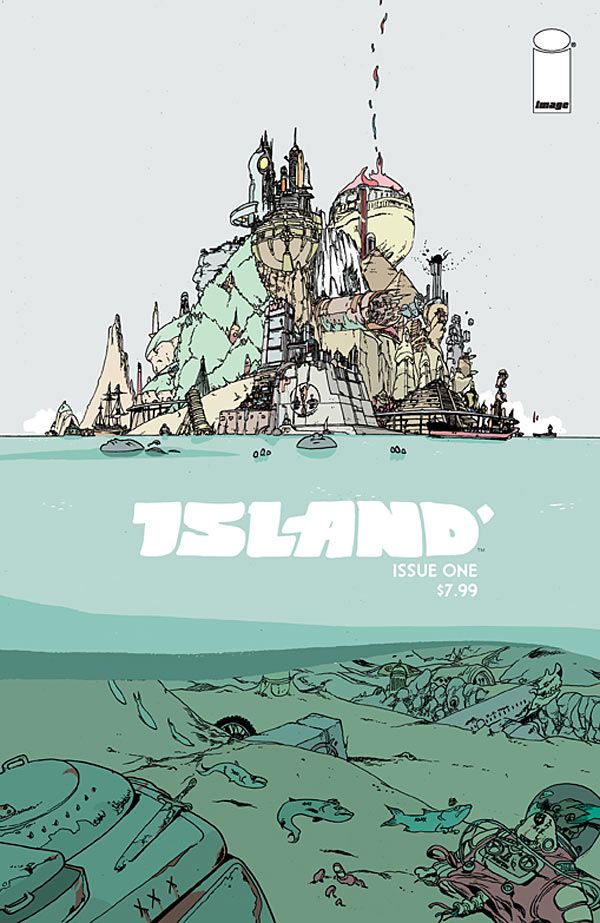"Island" #1 is a creator-owned anthology of original comics, curated by Brandon Graham and Emma RÃos. The debut issue has three major stories, a personal essay and some extras.
After a lush painted title page by Marian Churchland, "Island" #1 launches with "I.D." by Emma RÃos. Three characters -- all very different in appearance, background, personality and motivation -- are brought together. While the body modification twist is new, the shape of the story is old. Misfits are drawn together by a shared crisis, and the resulting themes of disenfranchisement and alienation go hand in hand with the plot.
"I.D." has spectacular, swiftly flowing artwork, but RÃos' dialogue is stilted and unnatural. Exposition is smooth, however, beginning in medias res. The doctor's office scenes that follow the cafe opener make the facts clear very quickly without feeling like information dumps. RÃos' facial expressions and body language are excellent for Noa, who is nervous and agitated, but they aren't nearly as strong for Charlotte, who looks like she's swooning when she's merely rolling her eyes. The red ink adds mood, but it's too bright and diminishes contrast. The resulting aesthetic losses are acute for the detailed cityscapes. While the story has some pull to it, RÃos' breathlessly dramatic linework is the real draw.
"Railbirds," written by Kelly Sue DeConnick and illustrated by Emma RÃos, is not a comic but tribute to and eulogy for her friend Maggie Estep. It's about their friendship, what kind of person Maggie was and what kind of person DeConnick was, described with powerfully emotional recollections and an extended analogy on horseracing. Emma RÃos' illustrations always show the two women in red and blue, reinforcing the bond at the center of the piece. DeConnick begins with a splendid hook of an opening sentence, but she stumbles immediately afterwards. The first two paragraphs are defensive, self-conscious and veer into self-indulgent metanarrative. Any cleverness is cancelled out by how these paragraphs further delay real substance. The third paragraph, ignoring the heavy-handed "Maggie taught me" refrains, is the true beginning. From there, the prose takes off smoothly. DeConnick's meditations on sobriety, rule-breaking, self-consciousness, addiction, pleasure and laughter are punctuated with vivid figures of speech and references from Aerosmith to Steinbeck. While "Railbirds" is a strange fit for a comic anthology -- especially since Estep wasn't a comics creator herself -- it's hard to argue against the inclusion of an eloquent, heartfelt essay.
In "Multiple Warheads 2: Ghosttown," Brandon Graham's gorgeous landscapes pair well with his wildly inventive character design. His color work is magnificent, especially in his pairing of indigo, mauve and Cheetos-orange on the second page. His wordplay and visual experimentation are charming. Transitions are anchored by homonyms and other flights of fancy. The only major complaint is the usual one of accessibility. Except for the title itself, there is little indication to a new reader that this piece is the latest of several "Multiple Warheads" installments. Graham's work is predictably, deliberately dense and difficult to follow, and this rigorous opacity can feel mercilessly unfriendly to newbies. His use of Leetspeak, which adds richness but yet another barrier to entry, is typical of his narrative approach. The reader must slow down to understand any of it but, once resigned to this change of pace, Graham's work is a pleasure to dissect.
"Dagger Proof Mummy" by Ludroe and Marthe Bazile is a visually smooth ride. The fighting in the first scene is kinetic and exciting, especially in the panels in which the clothing stripes and motion lines blur into one and the flashbacks intersect naturally. Unfortunately, the lettering is noticeably stiff and computer-like, a bad fit for the quick-moving, liquid flow of the story. The monotone coloring doesn't add visual depth but it makes scene changes sharper and adds some mood.
Also, Ludroe's prose is clunky and cliched. The dialogue and textboxes try too hard with rhyming and metaphors. Lines like "this city needs you" sound too much like a parody of Batman to have serious emotional resonance. The big plot twist is heavily foreshadowed and predictable, but the final impression of "Dagger Proof Mummy" is that the Ludroe's linework is able to convey the speed and highs of his true subject: skateboarding.
Last, Graham closes with "Polaris 1," in which he speaks directly to the reader about his creative process. It's wonderfully casual and candid, and the epigraph -- a quote from Fellini -- couldn't be more apt.
At $7.99, the price unfortunately isn't friendly to impulse purchasing, but readers who are existing fans of DeConnick, Graham, RÃos or Ludroe will not be disappointed. I'm a fan of the big page count that allows for longer chunks of interrupted story. Each piece in "Island" #1 has a satisfying length and impact.

